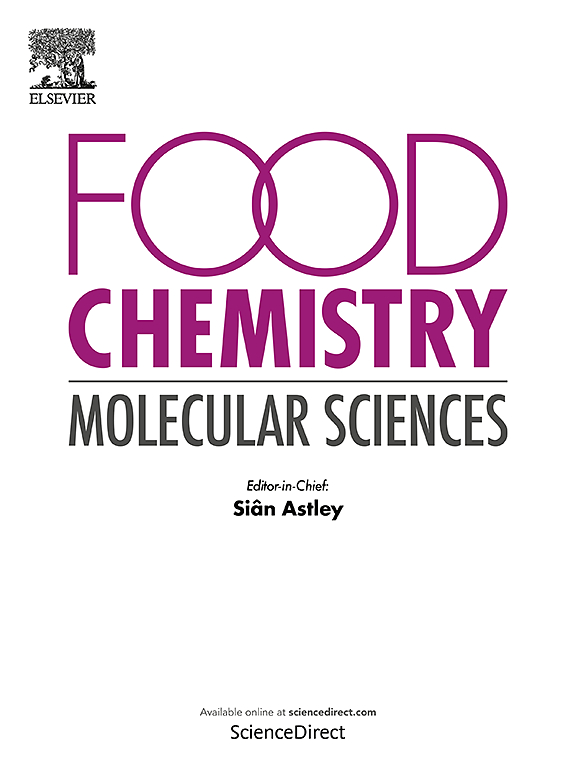Triglyceride-lowering effect of rice protein due to the regulation of fatty acid uptake and transport of triglyceride in rats fed normal/oil-enriched diets
IF 4.1
Q2 FOOD SCIENCE & TECHNOLOGY
引用次数: 0
Abstract
Dysregulation of fatty acid uptake and triglyceride transport can induce excess triglyceride accumulation. We propose that rice protein might suppress fatty acid uptake and/or triglyceride transport. To elucidate potential mechanisms, expressions of cluster determinant 36 (CD36), microsomal triglyceride transfer protein (MTP), fatty acid transport protein-2 (FATP-2), fatty acid-binding protein-1 (FABP-1), lipoprotein lipase (LPL) and Niemann-Pick C1-like 1 (NPC1L1) were investigated in growing and adult male Wistar rats fed with caseins and rice proteins under normal and oil-enriched dietary conditions. After two weeks of feeding, rice protein depressed the gene and protein expressions of CD36, MTP, FATP-2, FABP-1 and NPC1L1, whereas rice protein up-regulated those of LPL. As a result, rice protein significantly reduced the concentrations of triglyceride and fatty acid in the plasma and liver (P < 0.05) as well as the deposit of perirenal, epididymal and mesenteric fat (P < 0.05). The present study demonstrates an association between the depression of fatty acid uptake and triglyceride transport and the triglyceride-lowering effect of rice protein.
大米蛋白对正常/富油饮食大鼠脂肪酸摄取和甘油三酯运输的调节作用
脂肪酸摄取和甘油三酯运输失调可诱导过量的甘油三酯积累。我们提出大米蛋白可能抑制脂肪酸摄取和/或甘油三酯运输。为了阐明潜在的机制,在正常和富油的饮食条件下,研究了饲喂酪蛋白和大米蛋白的生长和成年雄性Wistar大鼠中聚类决定因子36 (CD36)、微体甘油三酯转移蛋白(MTP)、脂肪酸转运蛋白-2 (FATP-2)、脂肪酸结合蛋白-1 (FABP-1)、脂蛋白脂肪酶(LPL)和尼曼-匹克c1样1 (NPC1L1)的表达。饲喂2周后,水稻蛋白抑制了CD36、MTP、FATP-2、FABP-1和NPC1L1基因和蛋白的表达,上调了LPL基因和蛋白的表达。结果,大米蛋白显著降低了血浆和肝脏中甘油三酯和脂肪酸的浓度(P <;0.05),肾周、附睾和肠系膜脂肪沉积(P <;0.05)。本研究表明脂肪酸摄取和甘油三酯运输的抑制与大米蛋白降低甘油三酯的作用之间存在关联。
本文章由计算机程序翻译,如有差异,请以英文原文为准。
求助全文
约1分钟内获得全文
求助全文
来源期刊

Food Chemistry Molecular Sciences
Agricultural and Biological Sciences-Food Science
CiteScore
6.00
自引率
0.00%
发文量
83
审稿时长
82 days
期刊介绍:
Food Chemistry: Molecular Sciences is one of three companion journals to the highly respected Food Chemistry.
Food Chemistry: Molecular Sciences is an open access journal publishing research advancing the theory and practice of molecular sciences of foods.
The types of articles considered are original research articles, analytical methods, comprehensive reviews and commentaries.
Topics include:
Molecular sciences relating to major and minor components of food (nutrients and bioactives) and their physiological, sensory, flavour, and microbiological aspects; data must be sufficient to demonstrate relevance to foods and as consumed by humans
Changes in molecular composition or structure in foods occurring or induced during growth, distribution and processing (industrial or domestic) or as a result of human metabolism
Quality, safety, authenticity and traceability of foods and packaging materials
Valorisation of food waste arising from processing and exploitation of by-products
Molecular sciences of additives, contaminants including agro-chemicals, together with their metabolism, food fate and benefit: risk to human health
Novel analytical and computational (bioinformatics) methods related to foods as consumed, nutrients and bioactives, sensory, metabolic fate, and origins of foods. Articles must be concerned with new or novel methods or novel uses and must be applied to real-world samples to demonstrate robustness. Those dealing with significant improvements to existing methods or foods and commodities from different regions, and re-use of existing data will be considered, provided authors can establish sufficient originality.
 求助内容:
求助内容: 应助结果提醒方式:
应助结果提醒方式:


